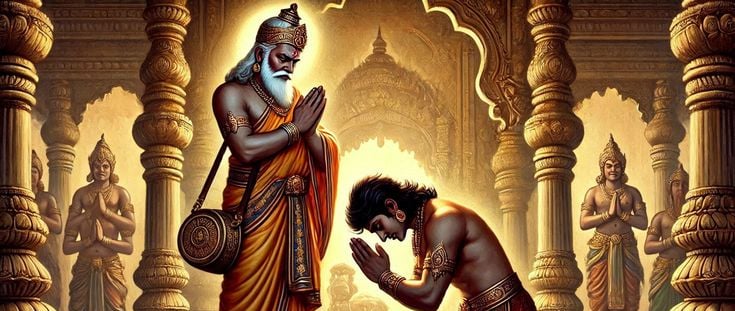"Eklavya and Dronacharya: The Truth Behind the Leftist Caste Myth
Leftist intellectuals, without understanding the deeper nuances of the epic, falsely claim that Dronacharya denied teaching Eklavya solely because he was from a lower caste. However, the reality is vastly different.
RELIGION
2/5/20253 min read


Debunking the Leftist Myth: Why Dronacharya Denied Eklavya and the Real Story Behind It
The leftist propaganda machine has long distorted Hindu history, especially the Mahabharata, to push a divisive caste narrative. One of the most misrepresented stories is that of Dronacharya and Eklavya. Leftist intellectuals, without understanding the deeper nuances of the epic, falsely claim that Dronacharya denied teaching Eklavya solely because he was from a lower caste. However, the reality is vastly different.
The truth is that Dronacharya did not reject Eklavya because of his caste but because Eklavya belonged to a hostile kingdom (Nishadha), which was an enemy of Hastinapura. Moreover, the story has a spiritual and karmic connection, which leftists deliberately ignore. Let’s break this down with historical facts, scriptures, and the real purpose behind Eklavya’s fate.
Who Was Eklavya? The Truth Leftists Won’t Tell You
Eklavya was the son of King Hiranyadhanu of the Nishadha tribe, a powerful but hostile faction that was allied with Jarasandha, the arch-enemy of Krishna and the Pandavas. Unlike the leftist narrative, Nishadhas were not considered "Dalits" or "outcastes"; they were a powerful warrior tribe. Eklavya himself was a prince and not a poor, oppressed boy as modern propagandists portray. Dronacharya was the royal guru of Hastinapura, sworn to train the Kuru princes (Pandavas and Kauravas) to protect the kingdom. It was against his duty to train an enemy warrior who could later use that knowledge against Hastinapura.
So, why does the left ignore this? Because it shatters their "caste oppression" theory, which they use to demonize Hinduism.
Why Did Dronacharya Deny Eklavya? A Strategic Decision, Not Caste Bias
1. Political and Military Reasons
Eklavya’s tribe was an enemy of Hastinapura, aligned with the powerful tyrant Jarasandha, who sought to destroy Krishna and the Pandavas. If Dronacharya trained Eklavya, he would have strengthened the enemy’s army, jeopardizing the security of Hastinapura. Teaching military skills to an enemy was considered betrayal, which is why he had to refuse Eklavya.
2. The Karmic Cycle: Eklavya’s Rebirth as Dhrishtadyumna
Eklavya’s fate was not just about rejection. According to the Mahabharata, he was reborn as Dhrishtadyumna, the warrior who was destined to kill Dronacharya. This was a karmic cycle, not an act of caste discrimination. Dhrishtadyumna was born to avenge Eklavya’s past life suffering and fulfilled that destiny in the Kurukshetra war.
3. Dronacharya Also Denied Karna—Was That Casteism Too?
Leftists love to claim that Dronacharya denied Eklavya due to caste, but they ignore that he also denied Karna, a Kshatriya by birth. Karna was refused training because he was not a prince of Hastinapura, similar to Eklavya. This was a matter of allegiance, not caste discrimination.
The Leftist Agenda: Why They Twist This Story
Leftist historians and politicians deliberately ignore the full story because their agenda is not about truth but about dividing Hindus using caste politics. Here’s why they push this false narrative:
To portray Hinduism as oppressive and justify their attack on Sanatan Dharma.
To create divisions among Hindus and break the unity of the Hindu community.
To erase the spiritual depth of our scriptures and replace it with their shallow Marxist interpretations.
If Dronacharya was truly casteist, why did he train Ashwatthama, his own son, who lived in extreme poverty? Why did he accept Drupada’s son, Dhrishtadyumna, even when he knew he would kill him? The truth is clear: his decisions were strategic, not caste-driven.
Eklavya’s Karmic Redemption: His Next Life and His Role in Krishna’s Plan
Eklavya was not abandoned by fate. He was later reborn as a warrior who got the opportunity to fight against Dronacharya in the Mahabharata war. Additionally, he had a crucial role in Krishna’s divine plan.
Later in his life, Eklavya became a commander in Jarasandha’s army, proving that Dronacharya’s concerns about training him were justified.
Krishna ultimately defeated Eklavya, ensuring he did not misuse his unmatched archery skills against Dharma.
In his next life, Eklavya was reborn as Dhrishtadyumna, fulfilling his karma by killing Dronacharya in battle.
This is not a simple tale of rejection but a profound story of karma, destiny, and dharma—a truth that leftists will never tell you.
Conclusion: Time to Reclaim Our Narrative
The leftist caste narrative around Eklavya and Dronacharya is a deliberate distortion to malign Hinduism and divide society. The real story shows us that it was never about caste but about political strategy, karmic justice, and divine intervention.
As Hindus, we must reject these false narratives and reclaim our history with pride and clarity. The Mahabharata is not about caste oppression but about Dharma, Karma, and Bhakti—a truth that leftists fear.